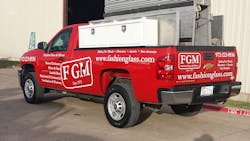Fashion Glass & Mirror taps propane autogas for fleet vehicles
Head: Fashion Glass & Mirror taps propane autogas for fleet vehicles
Deep in the heart of Texas, Fashion Glass & Mirror (www.fashionglass.com), an interior glass and mirror company serving residential and commercial properties, decided it was time to embrace a domestic-made fuel with less environmental emissions and significant cost savings. Leadership commissioned a review of propane autogas, natural gas and traditional gasoline to convert and replace its diesel-run fleets.
In early 2013, the company chose propane autogas. It now has 58 autogas-fueled trucks on the road and 10 more on the way with CleanFUEL USA (www.cleanfuelusa.com), a global manufacturer of certified and approved alternative fuel equipment for propane autogas.
“Right from the start, the economic benefits were attractive: lower fuel costs, fuel tax credits, decreased air pollution and fuel incentive programs and grants to off-set conversion costs,” say Mike Poe, Fashion Glass’ executive vice president. “There were also lower engine maintenance costs and longer engine life from the cleaner-burning propane fuel compared to our prior diesel truck fleet.”
“We are very pleased to have met our annual fuel cost savings estimate in the first year of propane autogas for our converted truck fleet.”
The company plans to continue to convert all trucks as they are ordered. As well, it installed a publically accessible propane autogas station at its corporate headquarters in Desoto, TX, for daily fleet refueling needs.
REDUCTIONS
Already the leading alternative fuel in the United States, propane autogas – the lowest greenhouse gas emitting fuel – costs an average of 30 to 40 percent less than gasoline, and up to 50 percent less than diesel, notes Curtis Donaldson, founder and managing director of CleanFUEL USA. Vehicles fueled by propane autogas emit 20 percent less nitrogen oxide, 60 percent less carbon monoxide and up to 25 percent less greenhouse gases.
The Fashion Glass project was funded in part by a grant from the U.S. Energy Department’s American Recovery and Reinvestment Act.
The company employs more than 200 people in four Texas locations, including its corporate headquarters, showroom and manufacturing facility in DeSoto serving the greater Dallas-Fort Worth markets, two manufacturing facilities serving the greater Houston, Austin and San Antonio markets and a showroom in the Dallas design district.
About the Author

